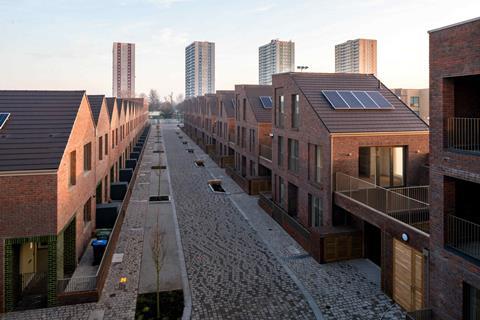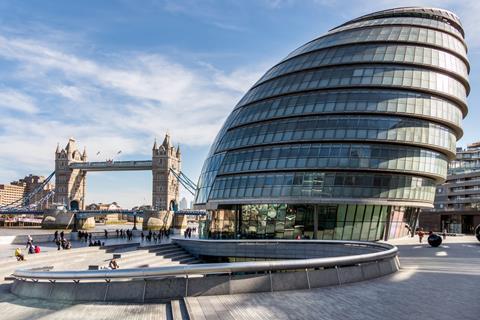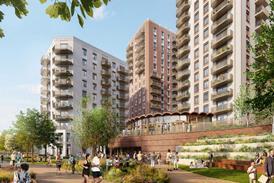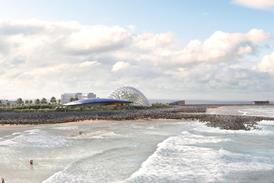Details of City Hall’s £3.4bn allocation also reveal threefold increase in grant rate, partly because of rising materials costs
The extent to which some of the largest London-based social landlords have reduced their development ambitions has been exposed as the Greater London Authority made public its strategic partnership deals for the 2021-26 affordable housing programme.
The £3.46bn list of deals shows big reductions in the proposed output of affordable housing by clients including L&Q, Peabody and Notting Hill. L&Q’s allocation is a tiny fraction of that secured in the previous 2016-23 programme.
The list of strategic partnership deals also appears to show the extent to which grant rates have soared as the GLA has refocused its programme on homes for social rent, at the same time as housing associations have become less willing to cross-subsidise construction of affordable homes using receipts from for-sale housing.
The £3.46bn of deals are set to provide 29,456 homes in total, compared to almost 50,000 homes delivered from just £1.7bn of funding in the previous programme.
Clarion tops the list with the largest allocation under the strategic partnership programme. Its £240m partnership is designed to deliver 2,000 homes. Clarion was granted the fourth largest allocation in the 2016-23 programme.
Second on the list is Paragon Asra, with a £182m partnership for 1,455 homes, with Optivo third, getting an allocation of £180m for 1,500 houses.
Other housing associations in the top 10 include Hyde, Metropolitan and Genesis. However, the data also reveals the extent to which the GLA is now expecting to rely on councils to deliver its new programme – with four London boroughs making the top 10 of biggest grant recipients – compared with just one in the last round.

The London boroughs of Barking & Dagenham, Enfield, Haringey and Southwark all appear among the 10 largest recipients of strategic partnership allocations. The boroughs have been granted £171m, £167m, £127m and £126m respectively and all have significant development programmes. Enfield council was shortlisted for RIBA’s client of the year award in 2017 after commissioning Karakusevic Carson Architects to design a new street of social housing, Dujardin Mews, as part of the wider regeneration of Ponders End. KCA worked with Maccreanor Lavington on what was the first social housing built by the council in four decades. Barking & Dagenham is working with Allies & Morrison and Levitt Bernstein to build 1,500 homes at the Gascoigne Estate and with PTE at Thames View East.
L&Q was the largest recipient of grant under the previous 2016-23 programme but has fallen to 23rd on the list this time round, revealing the extent to which the 105,000-home landlord has changed direction to focus on existing stock and tenants. The housing association giant, which Building Design’s sister title, Housing Today, revealed last month has finally abandoned its pledge to build 10,000 homes a year in the face of huge remediation costs on existing properties, has been allocated £55m to deliver just 539 homes – 5% of the houses it pledged to build last time around.
In the last programme it received an allocation of nearly £400m to build just shy of 12,000 homes.
Peabody, the recipient of the second-largest grant last time round, has fallen to 12th in the table, promising to build just 1,000 affordable homes, compared to 6,000 previously. In the 2016-23 programme it was allocated £221m; this time it has been allocated just £120m.
Overall the funding will see 16,739 homes built for social rent, with 12,717 built for shared ownership or at the London Living Rent level.
The average grant per unit for the homes is just under £118,000, a more than threefold increase on the £35,000 per unit in the 2016-23 programme, when much of the cost of affordable housing was expected to be met by cross-subsidy from private sale.

In total, City Hall has formed strategic partnerships with 53 providers, of which 26 – almost half – are either councils or development corporations. The rest are housing associations. In contrast just eight London boroughs were grant recipients in 2016-23.
There are also 26 new providers on the list, including those London boroughs. Other new entrants include housing association giant Places for People, as well as “for-profit” provider Resi Homes.
Mayor of London Sadiq Khan said: “Over the last five years I have overseen a council homes renaissance in London thanks to our relentless focus on giving boroughs the funding and expertise they need to build. I’m pleased to see this is now paying off with more than half the homes being funded at social rent levels in this deal being built by councils.
“Today’s funding is good news but I know we can still go further, faster, working with ministers, housing associations and councils to deliver more of the homes Londoners so desperately need.”
Regarding the increase in the grant rate, a spokesperson for the mayor said it was driven by a shift to building homes at social rent levels, alongside an increase in construction costs. “The mayor makes no apologies for insisting that the majority of homes built under the 2021-26 Affordable Housing Programme will be the social rented homes Londoners desperately need,” the spokesperson said.
“In order to deliver the lowest possible cost to the tenant at a time when Brexit and the pandemic have contributed to an increase in construction costs, these homes require a higher level of grant funding and ministers have agreed that the current subsidy level per home is reasonable.”
>> From the archive: Council housing: Getting it right this time
In total the GLA’s share of the English Affordable Housing Programme is £4bn, with the body aiming to deliver 79,000 homes. The details of the strategic partnership deals come a day after the government said it had allocated £8.6bn in total to 90 strategic partners across England, including the London allocation. Homes England, the body that manages the affordable housing programme outside the capital, has not yet revealed the details of its allocations.
L&Q has been approached for comment.
Full details of the GLA’s strategic partnerships programme, compared to allocations last time around, can be found on Housing Today.
















No comments yet